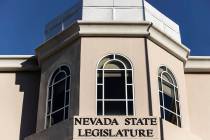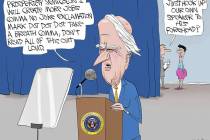Post-Trump GOP will face feuding factions
What will the post-Trump Republican Party look like?
Sure, there may be a last-minute upset when the votes are counted. But with all due respect to the electoral process, it’s not too soon to start thinking about what might happen if, as many polls indicate, Donald Trump loses the presidential election. Consider this exercise a thought experiment.
It’s a question that concerns more than merely Republicans. Even independents and Democrats have a rooting interest in a Republican Party that is a going concern; unchallenged one-party rule breeds corruption, cronyism and complacency.
One factor that will shape the Republican future is whether, and how, Trumpism survives Trump. That, in turn, will depend in part on whether Trump himself retreats offstage or instead transforms his email lists and campaign staff into a media company or an advocacy organization.
Trump’s policy agenda — the Mexican border wall, renegotiated trade agreements, a foreign policy more cautious about military interventions abroad — will itself face a post mortem. If Trump loses, were voters rejecting his message, or just the messenger? Would the same policy mix be more successful with a more disciplined, less bombastic candidate as its voice?
In figuring out the answers, Republicans will be pulled in different directions by various factions competing for power and influence.
The congressional wing of the party could emerge from a Trump loss with its majorities in both the Senate and the House either diminished or lost. The GOP’s congressional leaders and stars — Paul Ryan, Mitch McConnell, John Cornyn, Tom Price, Ted Cruz, Tom Cotton, Ben Sasse, Tom Cole, Tim Scott, Liz Cheney — would face the unenviable task of blocking the agenda and Borking the nominees of an incoming President Clinton. It’s an unenviable task precisely because no matter how immovable the congressional Republicans are, they’re likely to be insufficiently obstructionist to satisfy the base of grass-roots GOP activists and primary voters.
Republican governors in statehouses around the country are less tainted by Washington compromise. Many of them aren’t household names nationwide the way that Ted Cruz or Paul Ryan are. But even so, expect Republicans governors such as Rick Scott of Florida, Bruce Rauner of Illinois, Charlie Baker of Massachusetts, Bill Haslam of Tennessee, and Gregg Abbott of Texas to play a role in the future of their party. They can offer something of Trump’s outsider or businessman perspective, but without his lack of government experience.
If the party’s gubernatorial and congressional wings are in tension, so, too, are its donor class and its grassroots. The donor class — New York and Connecticut and Florida money managers, Texas oil men, Washington lobbyists — is drawn to candidates such as Jeb Bush or Mitt Romney who aren’t as good as Trump at sensing and conveying the anger and dismay of blue-collar or low-wage workers in the Rust Belt, Appalachia and the Deep South. Rural, religious conservative voters in Iowa, New Hampshire and South Carolina may be looking for something different in a presidential candidate than are their fellow Republicans in Palm Beach, Fla., or Greenwich, Conn.
Ordinarily, the task of crafting an ideology to unite these factions might fall to a party’s intellectuals. But here, too, Republicans face rifts between authors and policymakers who supported Trump and those who opposed him, with no shortage of grudges. If there’s hope to be found, it’s in the careers of those — Supreme Court Justices Samuel Alito and Clarence Thomas, former Secretary of State Condoleezza Rice, “Hillbilly Elegy” author and Marine Corps veteran turned Silicon Valley investor J.D. Vance — whose upwardly mobile biographies bridge the Republican base and its elites.
Opposition to a Clinton presidency, like opposition to Obama and his policies, will fuel fundraising and congressional campaigns. But Republicans will be in better shape if by the next presidential election they have a credible candidate and a positive program.
Ira Stoll is editor of FutureOfCapitalism.com and author of “JFK: Conservative.” His column appears Sunday.























